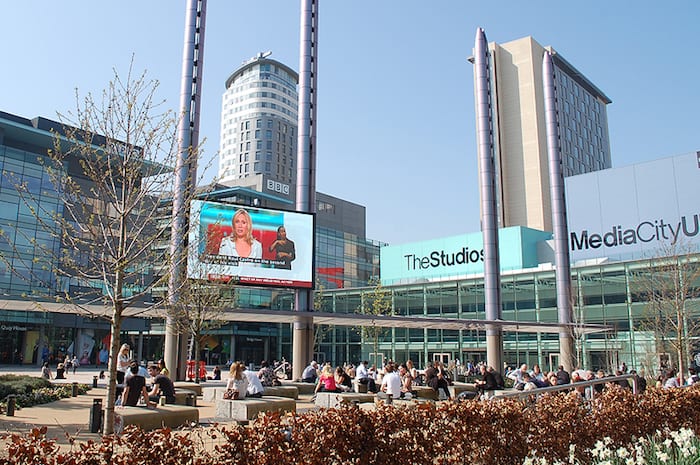Will Channel 4 join BBC in MediaCity?
- Written by Ray King
- Last updated 8 years ago
- Business, City of Salford

Will MediaCity UK at Salford Quays provide the new home of Channel 4 as well as being the northern base of the BBC, ITV and several major television production companies?
The Greater Manchester city region is among several possible locations – including the West Midlands, Merseyside, Leeds-Bradford, Sheffield, Bristol and Hull – that have expressed an interest if and when the government arm twists the arm of a reluctant Channel 4 to move out of London.
The government wants Channel 4 to do more to drive economic growth outside London, stimulate regional creative industries, and better serve audiences around the UK. The government has consulted on how best Channel 4 can do this and will set out its next steps in due course.
But London-based think tank The Centre for Cities has thrown a giant-sized spanner in the works by claiming that the relocation of large parts of the BBC to Salford has had a “negligible” impact on employment in the wider area.
The report concedes that between 2011 and 2016 following the BBC’s move, employment in Salford Quays grew by 4,600 – a rise of 43%. But the impact on the wider area was less pronounced because many of the jobs in MediaCity included roles transferred from the former Manchester HQ of the BBC in Oxford Road.
Paul Swinney, principal economist for Centre for Cities, warned that their findings showed that cities bidding to be the next home of Channel 4 should not expect a major boost to their economies from the relocation and should consider focusing on addressing skills gaps or improving transport infrastructure instead.
The think tank’s stance over Channel 4 seems bizarre when at the same time it has asserted that “attracting capital investment is vital” if regional cities are to rebalance the UK’s economy that’s overwhelmingly skewed in favour of London.
Centre for Cities has also stressed the importance of developing “clusters” of successful inter-related businesses. Could anything fit that description better than MediaCity?
On Mr Swinney’s advice that cities in the north should consider improving transport infrastructure instead of bidding for Channel 4, is it not curious that the think tank’s Housing and Transport section had nothing to say about the go-ahead for London’s CrossRail 2 at the expense of upgrading the Liverpool-Leeds rail route through Manchester?
However, the BBC said it did not accept the findings of the Centre for Cities’ report, while Greater Manchester Combined Authority described it as “flawed”.
A BBC spokesperson said: “We are surprised by this report as all other independent assessments of the BBC’s move to Salford have recognised the considerable benefit of the move, not just to the immediate MediaCityUK area, but to the wider economy of Greater Manchester and the north west.”
There is no question that the profile of the Manchester city region has been raised by the input of locally produced content into nationally networked broadcasts.
And Mike Blackburn, chair of the Greater Manchester Local Enterprise Partnership, added: “Quite frankly a report that says the BBC has not had a positive impact on Greater Manchester is ridiculous.
“The report is flawed, is far too narrow and fails to calculate the wider economic impact of jobs and the gross value added of direct and non-direct BBC employees and their families and the benefit to the wider economy.”
Channel 4 is publicly owned but funded by advertising so that, it claims, “we don’t cost the taxpayer a penny”. The broadcaster is currently headquartered in Horseferry Road, Westminster, but says it supports 17,000 jobs across the UK working with regional independent production partners.
According to Channel 4’s corporate website, the broadcaster spent £65 million on productions made in the north of England in 2016 compared with £20 million in the Midlands, £43 million in the south east and £19 million in Scotland.
- This article was last updated 8 years ago.
- It was first published on 11 August 2017 and is subject to be updated from time to time. Please refresh or return to see the latest version.
Did we miss something? Let us know: press@ilovemanchester.com
Want to be the first to receive all the latest news stories, what’s on and events from the heart of Manchester? Sign up here.
Manchester is a successful city, but many people suffer. I Love Manchester helps raise awareness and funds to help improve the lives and prospects of people across Greater Manchester – and we can’t do it without your help. So please support us with what you can so we can continue to spread the love. Thank you in advance!
An email you’ll love. Subscribe to our newsletter to get the latest news stories delivered direct to your inbox.
Got a story worth sharing?
What’s the story? We are all ears when it comes to positive news and inspiring stories. You can send story ideas to press@ilovemanchester.com
While we can’t guarantee to publish everything, we will always consider any enquiry or idea that promotes:
- Independent new openings
- Human interest
- Not-for-profit organisations
- Community Interest Companies (CiCs) and projects
- Charities and charitable initiatives
- Affordability and offers saving people over 20%
For anything else, don’t hesitate to get in touch with us about advertorials (from £350+VAT) and advertising opportunities: advertise@ilovemanchester.com

How a grassroots DJ collective is transforming Manchester’s music scene

Street parties and cathedral bells to mark the 80th anniversary of VE Day in Manchester

Churchill, Malala and Amy Winehouse come to life in this immersive MediaCity art exhibition



















